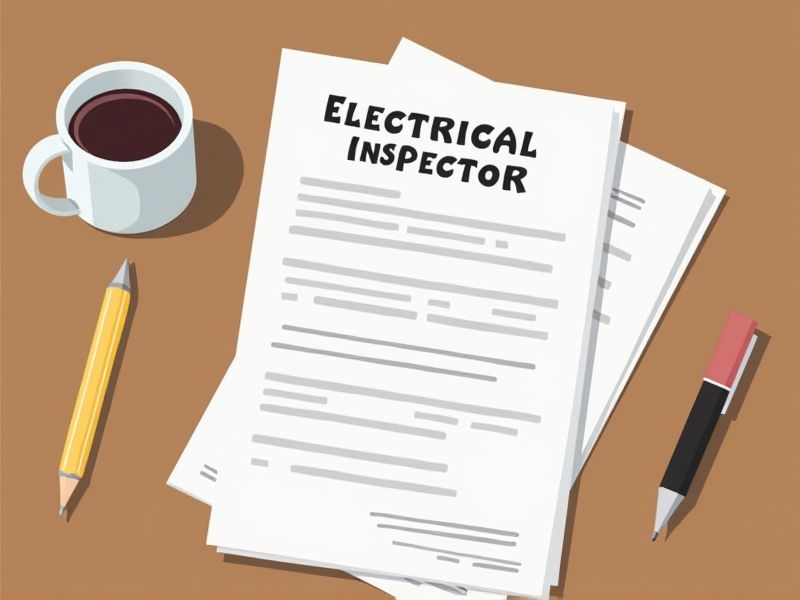
Electrical Inspectors ensure electrical systems adhere to codes and safety standards, requiring in-depth knowledge and skills. Certifications validate this expertise and demonstrate a commitment to ongoing education and compliance. Accredited credentials are often a prerequisite for employment, as they assure employers of proficiency in assessing and mitigating risks associated with electrical work. Key certifications may be essential for those pursuing a career as an Electrical Inspector.
NICET Certified Electrical Inspector
NICET Certified Electrical Inspectors provide assurance of technical competence and adherence to industry standards. Their certification signifies a standardized level of knowledge and skills crucial for complex electrical system evaluations. The qualification helps in minimizing the risks of electrical failures, ensuring safer installations and compliance with regulations. Certification also enhances credibility, benefiting stakeholders such as clients and regulatory bodies by fostering trust in inspection outcomes.
ICC Electrical Inspector Certification
Obtaining the ICC Electrical Inspector Certification ensures that inspectors possess the knowledge and skills to enforce electrical codes effectively. When inspectors are certified, it reduces the likelihood of safety hazards in buildings, as they are more reliable in identifying and correcting issues. Certification also adds credibility to the inspector's role, which can lead to increased trust from contractors and the public. The demand for certified inspectors often results in better job opportunities and potential career advancement.
National Electrical Code (NEC) Certification
The National Electrical Code (NEC) Certification ensures that an electrical inspector is knowledgeable about current safety standards and regulations, reducing the risk of electrical hazards. A certified inspector can competently identify and rectify code violations, which helps prevent electrical fires and accidents. The certification establishes a standardized benchmark for skills, increasing trust and credibility among clients and employers. As electrical systems become more complex, maintaining NEC Certification ensures inspectors stay updated with the latest technological advancements and safety protocols.
OSHA Electrical Safety Certification (10/30)
Obtaining OSHA Electrical Safety Certification ensures that an electrical inspector is knowledgeable about current safety regulations, reducing the risk of accidents. The certification validates the inspector's competence in identifying and mitigating electrical hazards on site. Enhanced safety on construction sites often leads to decreased downtime and financial loss for involved parties. Familiarity with OSHA standards can improve the inspector's credibility and trustworthiness when collaborating with contractors and employers.
NFPA 70E Electrical Safety Certification
NFPA 70E Electrical Safety Certification equips electrical inspectors with the necessary knowledge to assess and mitigate electrical hazards effectively. By undergoing this certification, inspectors are better prepared to ensure compliance with safety standards, reducing the risk of accidents. This qualification enhances an inspector's credibility and ensures that they can properly enforce safety regulations. The certification also helps in staying up-to-date with the latest safety protocols and industry best practices.
IAEI Electrical Inspector Certification
Possessing the IAEI Electrical Inspector Certification validates comprehensive knowledge of electrical codes, enhancing inspector credibility. It assures employers and clients of the inspector's competency in safety standards, reducing potential liabilities. The certification also offers a competitive edge in the job market, as employers prefer certified inspectors. Continuous education requirements of the certification ensure inspectors stay updated with the latest electrical safety practices.
Certified Electrical Safety Compliance Professional (CESCP)
Certified Electrical Safety Compliance Professional (CESCP) provides a specialized understanding of electrical safety standards, crucial for mitigating workplace hazards. This certification ensures the inspector has the knowledge necessary to identify and address compliance issues effectively. Electrical inspectors with CESCP credentials are more likely to ensure that installations adhere to the latest safety regulations. Their expertise reduces the risk of electrical incidents, enhancing overall safety outcomes.
Certified Energy Manager (CEM)
Certified Energy Managers possess specialized skills in optimizing energy systems, which enhances the effectiveness of electrical inspections by identifying energy inefficiencies. As energy conservation regulations become more stringent, the insights from a CEM ensure compliance and cost-effectiveness in electrical systems. Their expertise supports the integration of renewable energy technologies, aiding electrical inspectors in creating sustainable infrastructure. A CEM can significantly reduce energy-related operational costs by advising on efficient energy management strategies during inspections.
LEED Green Associate Certification
Obtaining the LEED Green Associate Certification provides an electrical inspector with an enhanced understanding of sustainable practices in building projects. This knowledge allows them to ensure electrical systems meet green building standards, directly influencing eco-friendly construction outcomes. Familiarity with LEED criteria enables inspectors to better evaluate installations for energy efficiency, impacting overall building performance. With this certification, inspectors can also contribute to achieving LEED credits, affecting a project's potential for higher certification levels.
Building Officials and Code Administrators (BOCA) Certification
The BOCA Certification for Electrical Inspectors ensures a standardized level of competency across safety assessments and code compliance tasks. Possession of this certification reflects the inspector's proficiency in interpreting and applying national and local electrical codes effectively. This qualification aids in reducing the likelihood of electrical malfunctions and hazards, leading to increased public safety in residential and commercial constructions. The certification supports career advancement by enhancing credibility and demonstrating commitment to continued professional development in the field.
Summary
By obtaining certifications, you enhance your credibility in the electrical industry. This often leads to increased job opportunities and potential salary growth. Certifications validate your expertise, making you a preferred candidate for complex projects. Employers benefit from reduced risk and increased compliance with industry standards.
